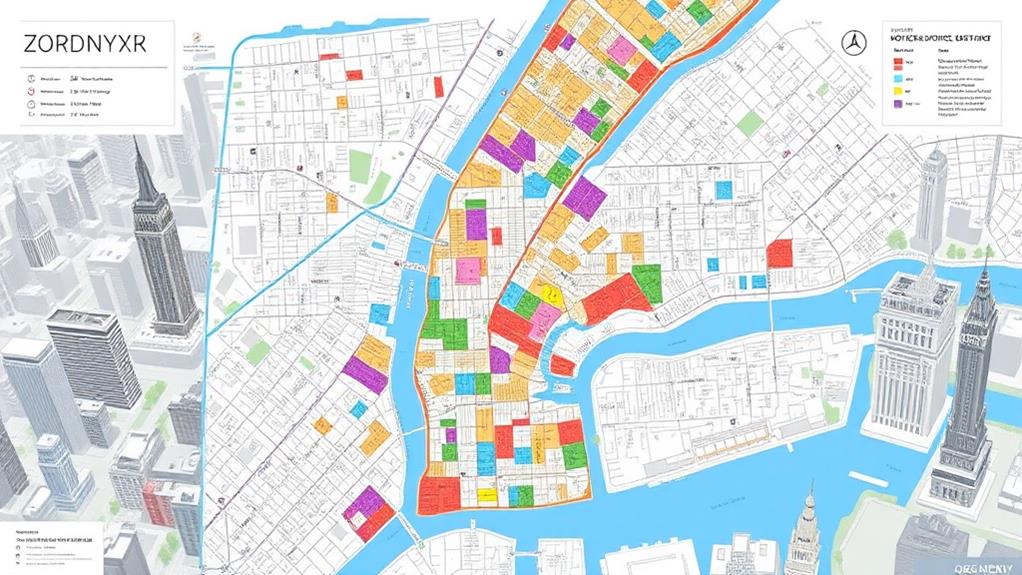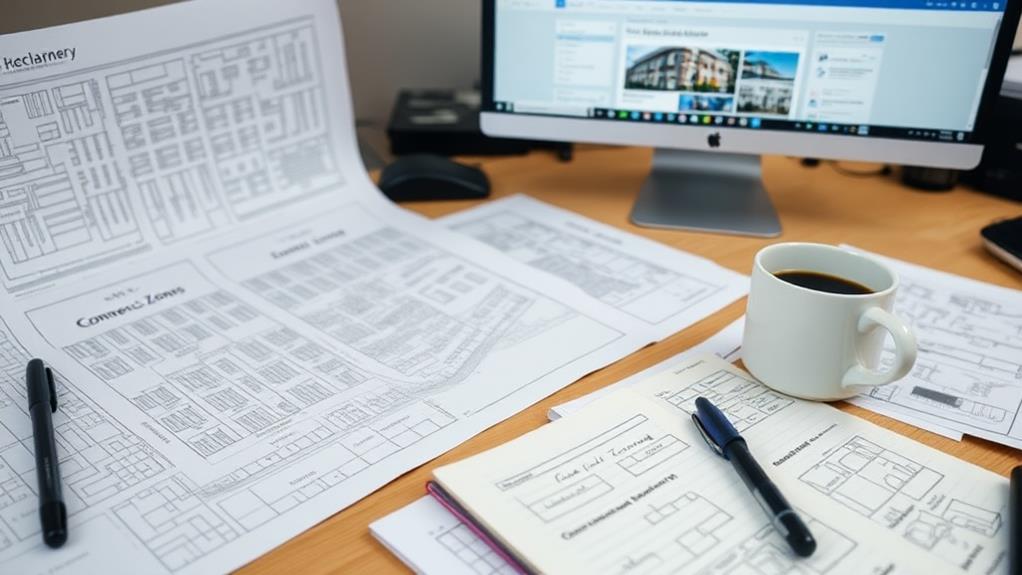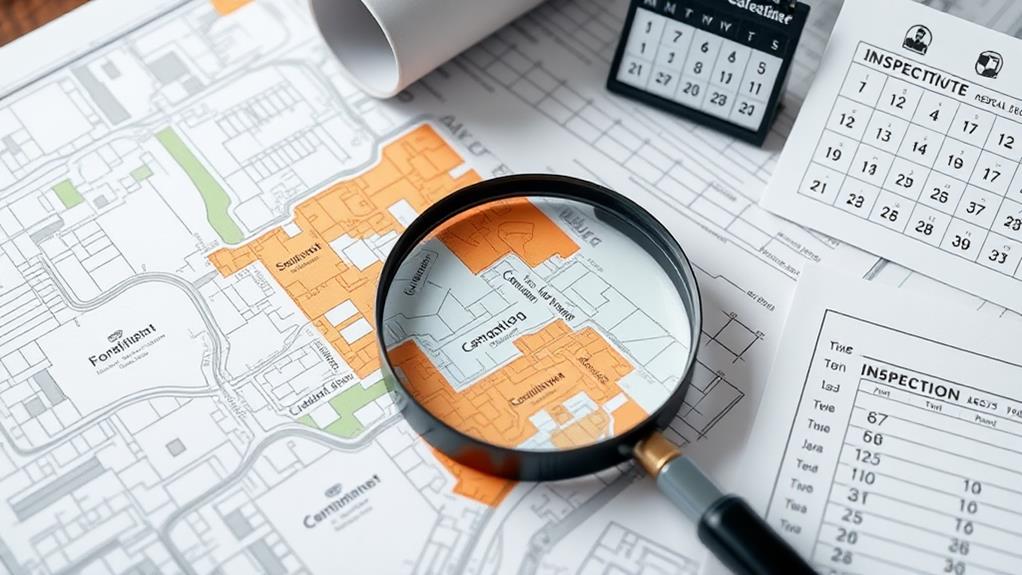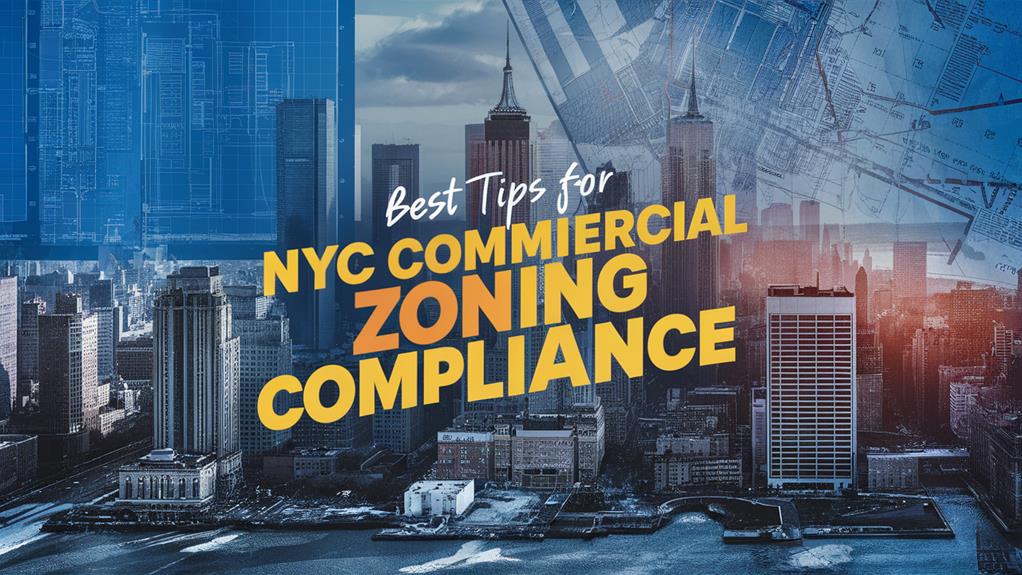To ensure NYC commercial zoning compliance, start by understanding zoning regulations specific to your area. Conduct thorough research on local rules through official websites and planning departments. Engage with zoning authorities by attending meetings and asking questions. Keep stakeholders informed and involved to strengthen support. Regularly monitor compliance by reviewing updates and performing inspections. If unique challenges arise, consider applying for a variance, backed by strong evidence. Finally, consulting legal experts can help navigate complex regulations and protect against potential disputes. By following these tips, you'll position yourself for greater success and clearer insights ahead.
Understand Zoning Regulations

Understanding zoning regulations is crucial for any property owner in NYC. These regulations classify properties into various zoning districts, such as Residential, Commercial, Industrial, and Mixed-Use. Each district has specific permitted uses and restrictions that you must follow.
The Zoning Resolution outlines important rules like building heights, lot sizes, setbacks, and parking requirements. A commercial contractor in New York can provide valuable insights into navigating these complexities and ensuring your project aligns with local regulations, as they focus on transformative urban development that enhances the urban fabric of the city.
For commercial properties, knowing the nuances of commercial zoning codes is essential. For example, categories like C-1 are designated for local commercial use, while C-4 is meant for central business districts. Recognizing these categories can help you ensure compliance and maximize your property's potential.
You can access zoning information through the NYC Department of Buildings or local planning departments. They provide helpful resources, including zoning maps and ordinances, which can guide you in understanding the regulations that affect your property.
It's also important to keep an eye on zoning regulations and any amendments. Local laws can change, impacting existing and future property developments. By staying informed and compliant, you'll be better positioned for success in the NYC real estate market.
Conduct Thorough Research
Conducting thorough research is vital for navigating NYC's commercial zoning landscape. As a property owner, you need to understand zoning regulations that dictate permissible uses for your property.
Start by visiting the NYC Department of Buildings (DOB) website to access zoning maps and resolution documents tailored to your specific location. These resources can provide foundational knowledge about land use planning in your area, including insights on emerging market trends that may affect your project.
If online information isn't comprehensive or accessible, don't hesitate to contact your local County Planning Department for further details. They can offer clarity on zoning regulations and potential compliance issues.
Additionally, reviewing property records like deeds or title documents can reveal valuable insights regarding historical land use and zoning designations.
It's also wise to bookmark important municipal website pages to stay updated on zoning regulations. This will facilitate quick access to the information you need.
Lastly, remember that engaging with local planning departments can help clarify any questions you may have regarding Special Use Permits and the zoning board's requirements.
Engage With Zoning Authorities

Engaging with zoning authorities early in your project planning can uncover potential zoning issues and help you avoid costly delays. By establishing a good relationship with these authorities, you can ensure a smoother path to compliance with zoning regulations.
Here are some key actions you should take:
- Attend public hearings and community meetings to understand local sentiments.
- Build relationships with local zoning boards for better communication on property inquiries.
- Utilize the resources and expertise of zoning authorities to clarify specific zoning laws.
- Regularly check in with zoning authorities to stay updated on any changes that may affect your project.
These steps are essential for navigating the complex world of permits and variances. When you engage with zoning authorities, you not only gather valuable feedback but also demonstrate your commitment to following the rules.
This proactive approach can lead to a more efficient approval process, ensuring that you meet all zoning regulations. Remember, the earlier you start these conversations, the better prepared you'll be to handle any challenges that arise.
Communicate With Stakeholders
Building strong relationships with stakeholders is key to ensuring your project's success in navigating zoning compliance. When you communicate with stakeholders early in the planning process, you foster transparency and alleviate community concerns about local zoning impacts.
This collaborative approach is particularly important in a dynamic environment like NYC, where urban transformation is ongoing and commercial redevelopment efforts can influence community sentiment. Regular interactions with city agencies, like the NYC Department of Buildings, help clarify zoning regulations and streamline your project's approval process.
Involving neighborhood stakeholders in discussions about your project plans can enhance support and minimize opposition. This collaborative approach makes it easier to comply with zoning laws.
Establishing a feedback loop with these stakeholders allows you to adjust project plans in ways that align with community interests and zoning requirements. Listening to their input shows that you value their opinions, which can lead to a smoother path to compliance.
Monitor Compliance Regularly

Maintaining compliance with NYC zoning regulations is crucial for the success of your commercial project. Regular monitoring helps you stay ahead of potential issues, ensuring your property aligns with current zoning codes.
Here are some key steps to keep in mind:
- Review updates regularly from the NYC Department of Buildings (DOB) to catch any changes in the Zoning Resolution or Building Code.
- Schedule periodic inspections of your commercial property to identify possible zoning violations before they escalate into formal notices.
- Keep accurate records of all property uses, modifications, and communications with zoning authorities. This documentation can be vital during compliance inquiries.
- Engage with local zoning boards to stay informed about upcoming public hearings or any changes that could impact your zoning status.
Utilizing professional zoning attorneys can also be beneficial. They can conduct compliance audits and offer guidance on adhering to all relevant zoning regulations.
Consider Variances When Necessary
When facing zoning challenges, considering a variance can be a game-changer for your commercial property. A variance allows property owners to deviate from specific zoning regulations when they can show a unique hardship related to their property. This makes it an essential tool for compliance in certain situations.
To apply for a variance, you'll need to present a compelling case to the zoning board. This involves providing evidence that the zoning ordinance is overly broad or vague for your property. Successful applications may lead to modified land use permissions that align with your goals while still adhering to zoning goals and community standards.
However, it's crucial to prove that your situation is distinctive and not just a matter of convenience. This requires thorough documentation and clear justification for your request.
Additionally, consulting with experienced zoning attorneys can significantly improve your chances of a successful variance application. They'll help ensure you meet all legal and procedural requirements.
In the world of commercial real estate, a well-planned variance can open doors to new opportunities while keeping you compliant with zoning regulations.
Consult Legal Experts

Navigating the complexities of NYC's zoning laws can be overwhelming, especially after considering variances. To ensure compliance and minimize risks, it's crucial to consult with legal experts who specialize in zoning regulations.
Here's why engaging these professionals is essential:
- They provide tailored advice for zoning disputes, helping you understand your rights.
- Legal experts can represent you in hearings, boosting your chances of a favorable outcome.
- They assist in applying for variances or special permits, showing necessary justification for deviations.
- Attorneys help document pre-existing non-conforming uses, protecting you from penalties linked to historical zoning violations.
Utilizing legal expertise can streamline the approval process and make navigating appeals to the Board of Standards and Appeals easier.
These professionals know the intricacies of zoning regulations and can help you maintain compliance while achieving your business objectives.
Without proper guidance, you risk facing costly violations or delays.
Conclusion
In summary, ensuring NYC commercial zoning compliance is like navigating a maze; it requires careful planning and attention to detail. By understanding regulations, researching thoroughly, and engaging with authorities, you can avoid potential pitfalls. Regularly monitoring compliance and communicating with stakeholders helps maintain smooth operations, while consulting legal experts can provide valuable guidance. Remember, staying proactive and informed will lead you to success in your commercial ventures, keeping your projects on the right path.


Leave a Reply